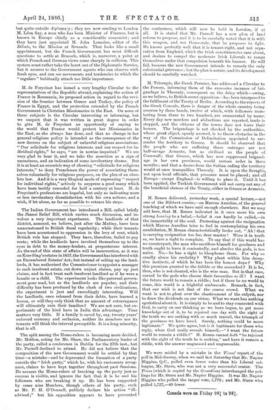M. Renan delivered, yesterday week, a special lecture,—not one of
the Hibbert course,—on Marcus Aurelius, of the general
teaching of which we have said enough elsewhere. But we may add here, that M. Renan indicated in it once more his own strong leaning to a belief,—belief it can hardly be called,—in the immortality of the soul. Protesting against the resignation which Marcus Aurelius tries to feel in contemplating his own annihilation, M. Renan characteristically broke out, " Ah ! that is carrying resignation too far, dear master ! Were it in truth so, we have a right to complain. To say that if this world has no counterpart, the man who sacrifices himself for goodness and truth ought to leave it contentedly, and absolve the gods, is too naive. No,—he has a right to blaspheme them. For why so cruelly abuse his credulity P Why plant within him decep- tive instincts, of which he has been the honest dupe P Why this premium granted to the fribble or the scoundrel P It is he, then, who is not cheated, who is the wise man. But in that case, cursed be the gods who choose their favourites so ill ! I want the future world to remain a riddle; but if there be no world to come, this world is a frightful ambuscade. Remark, in fact, that our wish is not that of the coarse crowd. What we want is not to gloat over the chastisement of the culprit, nor to draw the dividends on our virtue. What we want has nothing egotistical about it. It is simply to be and to stay connected with God, to carry on our thinking as we have begun, to get more knowledge out of it, to be rejoiced one day with the sight of the truth we are seeking with so much travail, the triumph of the goodness we have loved. Surely, nothing could be more legitimate." We quite agree, but is it legitimate for those who reply, when God really reveals himself,—" I want the future world to remain a riddle ?" M. Renau cannot both "he rejoiced with the sight of the truth he is seeking," and have it remain a. riddle, with the answer unguessed and unguessable.


































 Previous page
Previous page